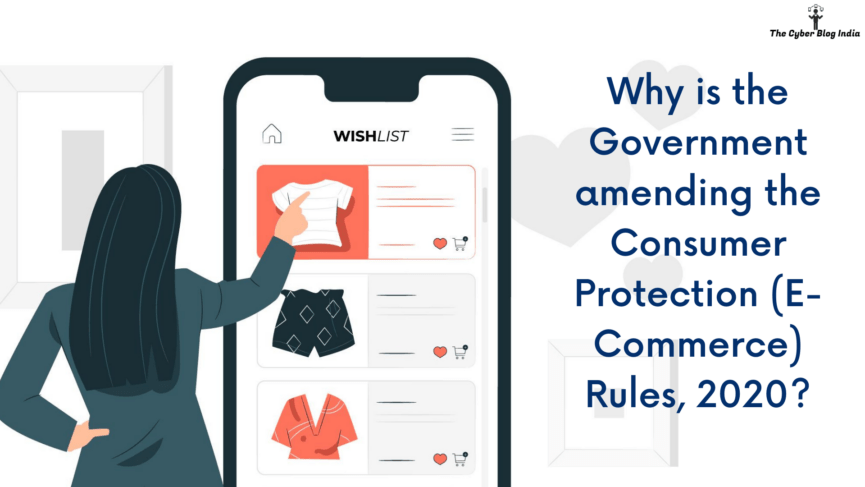Why is the Government amending the Consumer Protection (E-Commerce) Rules, 2020?

According to a PIB press release, the Government has received multiple complaints of cheating and unfair trade practice in the e-commerce ecosystem. Such instances have negatively impacted the business sentiment in the market. With an increasing number of e-commerce platforms and a lack of regulatory oversight, unfair trade practices flourish. Some of the identified problems include:
- Engaging in the manipulation of search results for promoting certain sellers,
- Giving preferential treatment to some sellers,
- Marketplace e-commerce entities involved in the indirect operation of sellers on their platform,
- Affecting the free choice of customers, and
- Selling goods close to their expiration date.
To minimise such instances, the Government has proposed various amendments to the Consumer Protection (E-Commerce) Rules, 2020. In one of our previous articles, we have discussed the 2020 Rules in detail. In this article, we will be looking at various changes that the Government has proposed.
Proposed changes for customers
1. Mis-selling
The new amendment introduces the concept of mis-selling. It defines mis-selling as selling goods or services by deliberate misrepresentation of information by an e-commerce entity. A seller gives false information about the product to make it appealing to a prospective buyer. Therefore, Rule 5(11) in the proposed amendment prohibits mis-selling to protect the consumers from cheating and fraudulent purchases of low-quality products.
2. Misleading advertisements
Rule 5(4) states that no e-commerce entity shall allow any display or promotion of misleading advertisements on its platform, whether in the course of business on its platform or otherwise.
3. Expiry date
The amendment will require e-commerce entities to display information about best/use before date. This information should be available in a clear and accessible manner. This will help consumers make informed decisions.
4. Fallback liability
This amendment introduces another concept called fallback liability. This concept defines the liability of a marketplace entity if a seller fails to deliver goods or services due to negligence or any other reason that results in a loss to the consumer. This fallback liability provision ensures that consumers are not affected when a seller does not deliver promised goods or services.
5. Manipulating search
E-Commerce entities provide their customers with a search feature to find relevant products and services. However, if e-commerce entities manipulate search results to favour particular products or sellers, consumers cannot make free choices about what they would like to buy. Due to this, other sellers on the same platform are also put in a disadvantageous position. If implemented, the new Rules will entirely prohibit the manipulation of search results.
6. Handling of consumer information
The proposed changes introduce the following requirements about consumers’ personal information:
- Marketplace e-commerce entities should not use information collected through their platform for the unfair advantage of their related parties and associated enterprises.
- E-commerce entities are responsible for ensuring that consumer information is only available to consumers. They should not disclose consumer information to a third party without the express consent of the consumer.
- No e-commerce entity should automatically record its consumers’ consent.
Proposed changes for other related parties
1. Flash sales
Rule 3(e) defines a flash sale as a sale organised by an e-commerce entity at significantly lower prices or other attractive offers for a predetermined period on select goods and services to attract the customers. At present, some e-commerce platforms enable preferred sellers only for providing deep discounts. This change aims at removing such flash sales through Rule 5(16) to protect other sellers registered with the concerned e-commerce entity. Preferential treatment to a select group of sellers impacts the opportunities of other sellers on a platform.
2. No abuse of position
With the proposed amendment, the Government seeks to prevent an e-commerce entity from abusing its dominant position in any market. This will minimise entry barriers present for upcoming e-commerce platforms.
3. Fair and equal opportunity to domestic products
As per Rule 5(7), when an e-commerce entity offers imported goods and services, it should:
- Identify goods based on their country of origin,
- Provide a filter mechanism on their e-commerce website,
- Suggest alternatives to ensure a fair opportunity for domestic goods,
- Provide ranking for goods, and
- Ensure that the ranking parameters do not discriminate against domestic goods and sellers.
Imported goods often substitute domestic products in the market due to their demand and reputation, which may leave domestic products and sellers in the dark. Therefore, this provision seeks to give domestic manufacturers a fair and equal opportunity to showcase their products.
Conclusion
A common criticism of the proposed changes in the Consumer Protection (E-Commerce) Rules, 2020, is that the Consumer Affairs Department is venturing into areas where the Department for Promotion of Industry and Internal Trade (DPIIT) and the Ministry of Electronics & Information Technology (MeitY) are already working. At the same time, one cannot deny that strengthening the regulation of the e-commerce ecosystem is the need of the hour as Indians increasingly become reliant on digital services. The proposed changes also include the appointment of a Chief Compliance Officer to ensure effective compliance with the parent Act and subsequent Rules and establish a strong foundation for grievance redressal mechanism. However, all of these proposed changes will only matter if they are implemented strictly with proper checks and balances.
Featured Image Credits: Shopping vector created by stories – www.freepik.com
